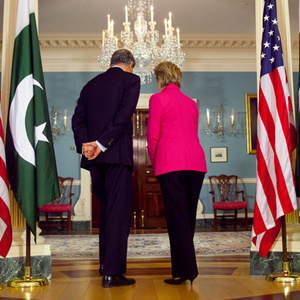Carrots and Sticks for Pakistan

Regardless, the politicians in Islamabad are following their own line. They are not looking for further friction with extremists in their northern neighbor; rather, they advocate their integration into Afghanistan’s politics. If the U.S. shows determination in following the same policy, Pakistan may be assured that its interests are served. Afghanistan is regarded as ‘strategic depth’ by Islamabad, and Pakistan will never tolerate an anti-Islamabad (read: pro-New Delhi) government’s rise to power in Afghanistan.
It seems that Washington has also understood –though perhaps a little late- that as long as Pakistan’s interests in Afghanistan are disregarded, the war continues, or in an even worse scenario, may lead to the Taliban’s victory. Washington certainly does not wish to experience what its once archenemy the Soviet Union suffered three decades ago. In this context, Hillary Clinton’s promise of a 7-billion dollar aid package takes on new meaning. More tempting sweeteners are the under-deliverance of F16 fighters, and future-delivered F18s. Pressures on Islamabad will of course not be forgotten, as the carrot is useless without the stick.
Meanwhile, on July 18, 2010 and under U.S. pressure—in another step to convince Pakistan to abandon backstage support (and to solve the problem) of the Taliban—Pakistan and Afghanistan signed a trade pact. Pakistan should take a major role in Hamed Karzai’s ‘national reconciliation’ plan aimed at the integration of the Taliban into Afghan society.
* Pir-Mohammad Mollazehi is an expert in Indian Subcontinent affairs.

